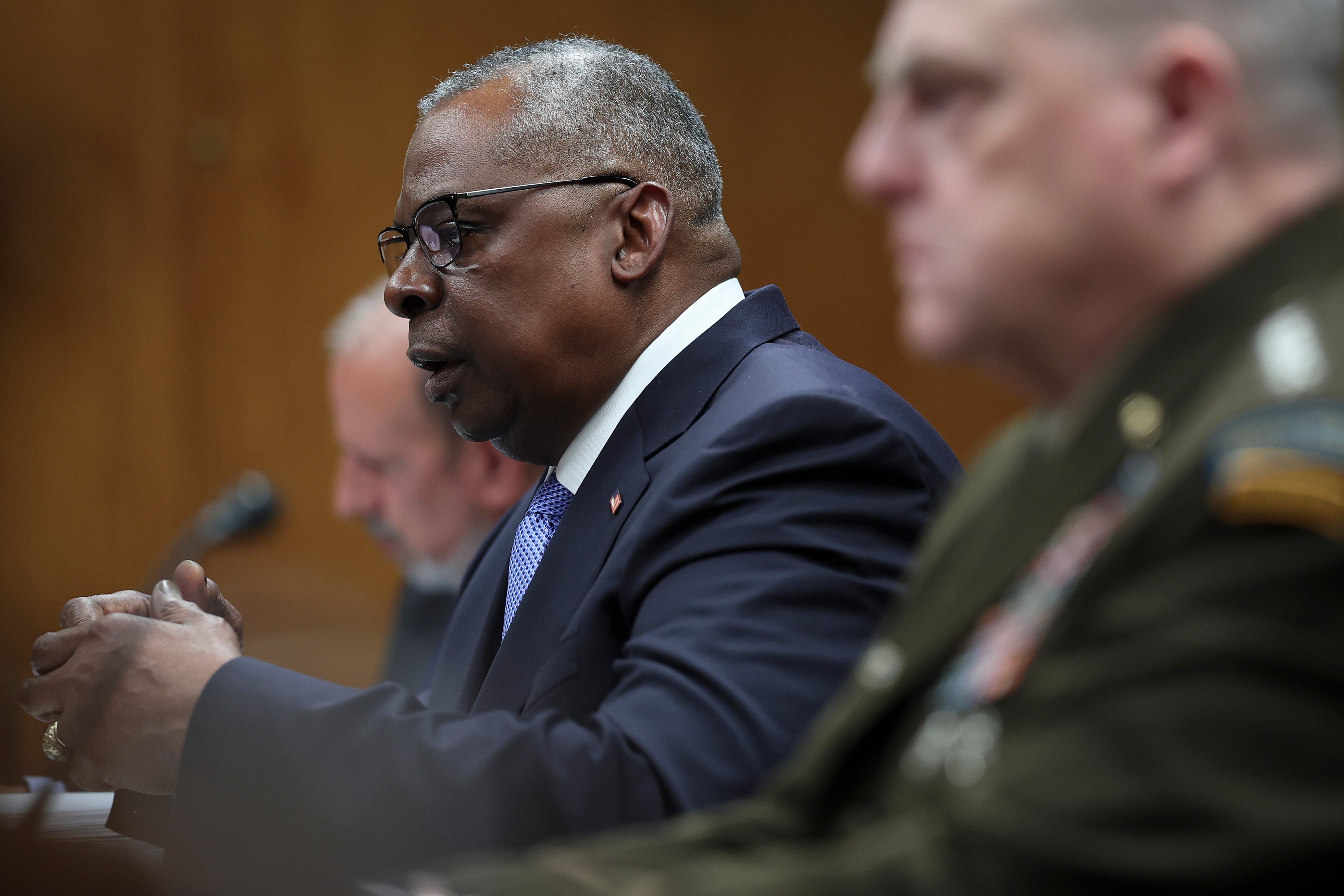As questions remain about why Defense Secretary Lloyd Austin was hospitalized on Jan. 1, and why his team failed to notify the president until several days later, the Pentagon’s top spokesman has confirmed that a member of Austin’s entourage did not notify his chief of staff about the hospitalization until roughly a day after he was admitted to Walter Reed National Military Medical Center, and that she in turn did not notify the White House until Thursday.
It’s the latest revelation regarding the defense secretary’s emergency incapacitation last week, in which the White House did not learn of Austin’s absence leading the department until Thursday, with Congress and the general public only becoming aware of the cabinet member’s incapacitation on Friday.
The Pentagon has refused to offer details about Austin’s initial medical procedure on Dec. 22 and what prompted him to be admitted into intensive care at Walter Reed on New Year’s Day, when he was rushed to the hospital after experiencing severe pain, according to officials.
Austin has resumed his duties after deferring to a deputy, although he remains hospitalized.
The lingering questions about why no one was told of Austin’s hospitalization come at a tenuous time for the U.S. military, as the Israel-Hamas war continues to threaten to morph into a broader conflict and the Ukraine-Russia war rages on.
Air Force Maj. Gen. Pat Ryder, the Pentagon press secretary, said Monday that Austin’s chief of staff, Kelly Magsamen, was out with the flu early last week when she learned the news and did not make any moves to notify parties outside Austin’s immediate team until she after returned to work on Thursday.
RELATED

This breakdown of communication, and the consequences of it, are in stark contrast to what any uniformed member of the military would face in similar circumstances.
Absence without approved leave violates Article 86 of the Uniform Code of Military Justice, and its violation carries a maximum of six months jail time a bad conduct discharge, according to the Manual for Courts Martial.
Still, the comparison of Austin’s absence to that of a uniformed service member going AWOL isn’t entirely applicable, according to Rachel VanLandingham, director of the National Institute of Military Justice and a retired Air Force lieutenant colonel.
“Austin is a political appointee, so this is an issue between him and the president,” she told Military Times on Monday.
Still, VanLandingham added, Magsamen should have notified the higher-ups sooner.
“This was a staff issue as much as a failure of judgment by Austin,” she said.
Ryder declined to answer multiple questions Monday regarding why Magsamen didn’t delegate her authority to notify the president or Congress if she herself was ill.
“And so [I’m] not standing up here looking to make excuses other than the explanation for why there was a delay and the fact that we know we can do better and we’re committed to doing better,” Ryder told reporters.
RELATED

Ryder himself took responsibility for the lack of public disclosure, admitting that he first learned of Austin’s hospitalization on Jan. 2 from Chris Meagher, assistant to the defense secretary for public affairs.
“In retrospect, I should have asked those harder questions and I should have pushed for an earlier public acknowledgement,” Ryder said, adding that at the time, he didn’t feel at liberty to publicly discuss Austin’s health.
Deputy Defense Secretary Kathleen Hicks, who was tapped to handle Austin’s responsibilities starting Jan. 2 while on vacation in Puerto Rico, was also unaware of why she had been put in charge, Ryder said.
But it’s also “not uncommon” for her to to take on those authorities on short notice, Ryder added. For instance, she’d done so during Austin’s original Dec. 22 visit to Walter Reed for the undisclosed medical procedure that led to complications.
She’d also been in charge briefly earlier that week, he said, as Austin flew via CMV-22B Osprey to visit the aircraft carrier Gerald R. Ford in the Mediterranean Sea.
The defense secretary’s front office is now reviewing whether any legal notification procedures were violated, Ryder added, and to create a codified procedure for the future.
Ryder said Monday that he did not know whether a law exists for who notifies the president and Congress of a cabinet member’s incapacitation, and how quickly that should occur.
There should be a written policy requiring that the president be notified immediately when any member of the Cabinet is incapacitated, VanLandingham said.
“But Cabinet secretaries are not military members, so accountability takes on a very different perspective,” she added.
Austin said in a statement Saturday that he takes full responsibility for the communication breakdown. Ryder said the secretary has no plans to resign, and a White House spokesman on Monday told reporters that Biden appreciates Austin’s handling of the situation.
“The president respects the fact that Secretary Austin took ownership for the lack of transparency. He also respects the amazing job he’s done as defense secretary, and how he has handled multiple crises over the last almost three years now,” John Kirby, spokesman for the National Security Council, said. “He very much values his advice, candor, leadership, and again looks forward to having him back again.”
The Associated Press contributed to this report.
Meghann Myers is the Pentagon bureau chief at Military Times. She covers operations, policy, personnel, leadership and other issues affecting service members.




